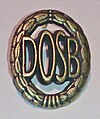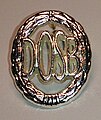German Sports Badge
| Deutsches Sportabzeichen | |
|---|---|
German Sports Badge ribbon bar in Bronze | |
| Type | Badge and Ribbon |
| Awarded for | physical fitness |
| Description | Comes in three classes: gold, silver and bronze |
| Presented by | German Olympic Sports Federation DOSB |
| Eligibility | Civilians, Soldiers of the German armed forces and Allied nations (military version) |
| Status | Currently awarded |
| Established | November 10, 1912 (civil version) |
| Website | https://www.deutsches-sportabzeichen.de/ |

The German Sports Badge (German: Deutsches Sportabzeichen (DSA)) is a decoration of the German Olympic Sports Federation DOSB. The German Sports Badge test is carried out primarily in Germany, and in other countries abroad.
History
The German Sports Badge, also known as the German National Sports Badge, was first created in the year 1913, and is one of the oldest German awards still in active circulation. At first the German Sports Badge was only issued to men for the completion of various physical tests. In 1921 it was renamed the Deutsches Turn- und Sportabzeichen, and women became eligible to receive it as well.

In Nazi Germany the design of the badge remained basically the same but a swastika was added at its base. Since 1935, the letters "DRL" ("Deutscher Reichsbund für Leibesübungen") replaced the letters "DRA" ("Deutscher Reichsausschuss für Leibesübungen"). On 1 July 1937 it was renamed to Deutsche Reichsauszeichnung für Leibesübungen and obtained the status as an official recognised decoration of the state. In 1938, the Austrian Sports Badge was incorporated in the German Sports badge. The last tests for the Deutsche Reichsauszeichnung für Leibesübungen were held in 1944.[1]
After World War II, the German Sports Badge was reinstated 1952 by the German Sports Association in West Germany and continued in this status after the German reunification.[2] it has been approved and awarded by the President of Germany since 4 July 1958 and can be worn on Bundeswehr, Bundespolizei and Technisches Hilfswerk uniforms.
In 1993 the DOSB opened an international office called Ausland which allows non-Germans to organize, participate and obtain the DSA outside Germany, but only under supervision of an authorized Verein (sport organisation) and authorized Pruefer (judge); the decoration can be awarded to any person participating in the test.
In 2007, the letters changed from "DSB" ("Deutscher Sportbund") to "DOSB" (German Olympic Sports Federation).
The structure of the German Sports Badge was changed in 2013 to its current form.
The German Sports Badge has also been made an entry requirement for certain German Police services.[3]
Requirements
Present day
The workgroup Projektgruppe Deutsches Sportabzeichen of the German Olympic Sports Association announced various changes for the German Sports Badge. The following changes and various further changes were in full power by 2013:[4]
- Basic and advanced levels, as seen on the Austrian Sports Badge were introduced. Formerly the grades bronze, silver, and gold were awarded according to the number of yearly repetitions.
Since 2013 the grades are determined by the score which is achieved. In each discipline, a score between one and three points can be earned. The final score determine the grade of the sports badge: Bronze: 4–7 Silver: 8–10 Gold: 11–12
- Rearranging the age groups
- Adapting the requirements to modern standards
- German Sports Badge lapel pin in bronze as awarded by the German Olympic Sports Federation
- German Sports Badge ribbon in silver as awarded by the German Olympic Sports Federation
- German Sports Badge lapel pin in silver as awarded by the German Olympic Sports Federation
- German Sports Badge ribbon in gold as awarded by the German Olympic Sports Federation
- German Sports Badge lapel pin in gold as awarded by the German Olympic Sports Federation
Special awards:
- German Sports Badge for juveniles Deutsches Sportabzeichen für Kinder und Jugendliche [5]
- German Sports Badge with special requirements for handicapped persons.
Ability to swim
The ability to swim must be demonstrated by either a 12-minute swim, the completion of a swimming test of the other disciplines, or by completion of a German swimming badge.
Endurance
One of:
- 3,000 m run,
- 10 km run,
- 7.5 km power-walking,
- or 20 km cycling.
Strength
Stone- or shot-put, apparatus gymnastics, standing long-jump
Speed
50m- or 100m sprint, 25m swim, 200m bicycling, apparatus gymnastics
Agility
High-jump or Long-jump, rope skipping, or leap frogging
Acceptance of sports badges from different sports
Certain disciplines may be substituted with sports badged from other sports. For instance: Endurance can be substituted with the German rescue swimming badge, triathlon badge, running badge, or pentathlon badge. Agility can be substituted with the German Ju-Jutsu badge, German track and field badge, and others.[6]
Requirements until 2013
Until 2013, the following requirements had to be completed to be awarded the sports badge (Requirements vary according to age category and gender):[7]
| Group | Section | Disciplines | Substitutes |
|---|---|---|---|
| 1 | Swimming | 50 or 200 meters swim | none |
| 2 | Jumping power | High-jump or Long-jump | Pommel horse or leap frogging |
| 3 | Speed | 50/75/100/400/1000 meter run, 300/500 bicycling or 300/500 meters inline-skating | Ice-skating |
| 4 | Physical strength | Stone- or shot-put, 100 meter swim | Shooting sports, Bench press or weightlifting, Canoeing or rowing |
| 5 | Endurance | 800/1000/2000/3000/5000 meters run, 5000/10000 meters inline-skating, 10 kilometers walk, 7 kilometers Walking/Nordic Walking, 20 kilometers bicycling, 600/1.000 meters swim cross-country skiing | Canoeing, rowing, bowling or ice-skating |
Sportabzeichen judge

Prospective judges (Prüfer) have to fulfill certain requirements in order to obtain judging qualifications and licence (Prüfausweis):
- Membership in a German sports club (Vereine).
- Have completed a German Sports Badge (Repetitive completion on a yearly basis is preferred).
- Previous experience of assisting a judge for the German Sports Badge.
- Licensed sports coach or completion of judging class.
A license for a judge is valid for a period of four years. The licence can be obtained from DOSB only via German sports club (Vereine).
German school physical education instructors and Bundeswehr instructors underlie different requirements.
German citizenship for a judge is not required, however, the judge has to be holding the tests for a German sports association (Vereine), a German school or the German military. However, exceptions can be made in special cases. In general the non German Prüfer are foreign citizens around the world with German origin or family; exceptions are known in Denmark, as a Danish National who was made judge for the Danish Emergency Management Agency, due to the fact that Denmark had no Sportsabzeichen-judges; another significant exception is in Italy where within the Italian Armed Forces the German Sport Badge become popular since 2003 and now there are 5 Italians holding the Prüfausweis (licence to be a judge).
The badge for a judge (Prüferabzeichen) was similar in shape as a regular sports badge, however, the color is green and it features a banner with the inscription Prüfer. The Prüferabzeichen is no longer awarded, instead a T-shirt with the text "Sportsabzeichen team" is given out.[8][9]
Judges (Prüfer) for the German Sports Badge may also judge the following badges:
- Austrian Sports Badge
- European Police Achievement Badge
- Bavarian Sports Badge
- Deutscher Leichtathletik-Verband Running Badge
Design:
- The ribbon is red, green, black, yellow and blue with the badge in the center. In 2007, the letters were replaced by DOSB
- German ribbon format
- The post-2007 bronze badge suspended in a Danish style ribbon, for wear on uniforms
Bavarian Sports Badge

The Bavarian Sports Badge (German Bayerisches Sport-Leistungs Abzeichen or BSLA) was a sports badge awarded by the Bavarian Athletes Organization (Bayrischer Landes-Sportverband). Due to the reform of the German Sports Badge, which from 2013 has also been awarded for difference performance levels, the Bavarian Sports Badge ceased to be awarded from 2013.
The Bavarian Sports Badge is comparable to the German Sports Badge, however, differences exist:
- The letters SLA instead of DOSB are shown in the award
- The bronze, silver and gold awards indicate the level of difficulty instead of the number of repetitions
- Higher requirements must be fulfilled in order to be awarded the sports badge[10]
- The German Sports Badge may be worn on some countries military uniforms as an official German decoration, but the Bavarian may not.
See also
- Order of Merit Cross of the German Federal Republic
- Awards and decorations of the German Armed Forces
- European Police Achievement Badge
- Austrian Sports Badge
- German rescue swimming badge
- List of German Sports Badges
References
- ^ Jürgen Buschmann & Karl Lennartz: 75 Jahre Deutsches Sportabzeichen. Dt. Sportbund, Frankfurt/Main 1988, S. 61 (ISBN 3-89152-377-7).
- ^ "Statistik und Historie". www.deutsches-sportabzeichen.de (in German). Retrieved 2019-03-08.
- ^ "Apache HTTP Server Test Page powered by CentOS". www.polizei.nrw.de.
- ^ "Archived copy" (PDF). Archived from the original (PDF) on 2010-02-24. Retrieved 2010-09-20.
{{cite web}}: CS1 maint: archived copy as title (link) - ^ "Der Deutsche Olympische Sportbund : Sportabzeichen für die Jugend". Deutsches-sportabzeichen.de. Archived from the original on 2011-11-29. Retrieved 2011-12-03.
- ^ "Archived copy" (PDF). Archived from the original (PDF) on 2013-10-29. Retrieved 2013-10-27.
{{cite web}}: CS1 maint: archived copy as title (link) - ^ "Archived copy". Archived from the original on 2011-07-18. Retrieved 2010-05-19.
{{cite web}}: CS1 maint: archived copy as title (link) - ^ "BLSV – Sportabzeichenprüfer". Blsv.de. Retrieved 2011-12-03.
- ^ "Der Deutsche Olympische Sportbund : Infos für Prüfer". Deutsches-sportabzeichen.de. Archived from the original on 2011-11-29. Retrieved 2011-12-03.
- ^ "BLSV - Bayerisches Sport- Leistungs-Abzeichen". Blsv.de. Archived from the original on 2011-09-10. Retrieved 2011-12-03.
Bibliography
- Doehle, Dr Heinrich (1943). Die Auszeichnungen Des Großdeutschen Reichs. Berlin, Germany: Berlin-Buch und Periodical Press. ISBN 0-9624883-4-8.
- Miller, Michael (2015). Knight's Cross Holders of the SS and German Police 1940–45. England: Helion & Company. ISBN 978-1-909982-74-1.







